Toggle Background Color
Chapter One: Prologue (1066-1070)
In 1016, Norman pilgrims returning from Jerusalem visited the shrine to the Archangel Michael at Monte Gargano in Apulia, where they were met with an appeal by Melus of Bari, a Lombard nobleman who desired to expel the Byzantine Empire from the Mezzogiorno. Within a year, Norman knights were making their way to Southern Italy.
The Normans could boast an unusual history, having descended from the Vikings who first pillaged the Northern coast of France, then began to settle and intermarry with the locals, eventually adopting their own version of French culture. Many sons of Normandy kept the adventurous, martial hearts of their Viking ancestors, however, and the lure of potential fortune in the South was too much for many landless second sons to resist.
Now, 50 years later, the Normans are the pre-eminent power in Southern Italy, succeeding where Melus and the Lombards failed. From humble origins as mercenaries and highwaymen, they have succeeded in driving out the Byzantines and consolidating their power. Most of them are led by Robert d?Hauteville, known as ?Guiscard?, recently invested by Pope Nicholas II with the titles of Duke of Apulia and Calabria.
Robert, like many of the Normans who made their name fighting in the Mezzogiorno, has relatively humble origins, being the sixth son of an undistinguished minor lord in Normandy, Tancred d?Hauteville, in turn said to be descended from one Hiallt, a Norseman from whom the name of the village of Hauteville is said to derive. Hiallt is in turn said to have been descended from the legendary hero Ogier the Dane and King Godfrey of Denmark, but the evidence for such legends is scant at best.
What is undisputable, though, is the energy, cunning, and martial skill Robert has so far displayed in his rise to power. Having been preceded by his elder brothers William, Drogo, and Humphrey, each Count of Apulia in turn, he inherited the county ? over Humphrey?s young son ? in 1057 after having demonstrated his ability on countless previous occasions, including in the conquest of Calabria and at the Battle of Civitate, where Humphrey, Robert, and Richard Drengot defeated the forces of Pope Leo IX and secured the future of the Norman states in Southern Italy.
Now, thanks to a change in Papal policy, Robert has not only been confirmed as Duke of Apulia and Calabria, but has also been given a papal endorsement to invade the island of Sicily, long held by Muslim Arabs and harbour to countless pirates who plague the coasts of Italy. Already the city of Messina has been conquered, but the first expedition to capture Palermo ended poorly, temporarily halting the island?s conquest.

To the East, the Byzantines would no doubt like to reclaim Southern Italy, but they have far greater problems on their hands at the moment. The Seljuk Turks, led by the great Alp Arslan, have launched an invasion of Anatolia, and the weak Basileus looks to be nearly powerless to resist.


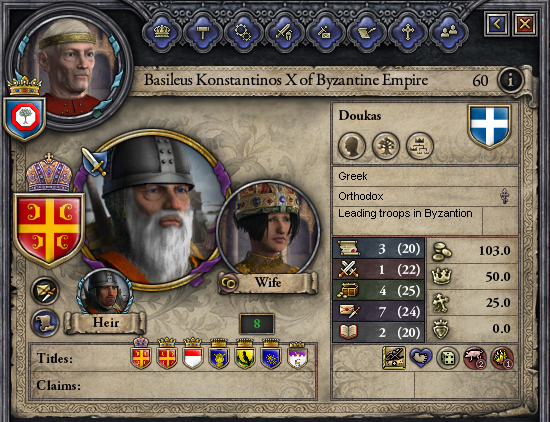
To the West, another conflict between Christians and Muslims simmers rather than rages, with the Christian kingdoms of Spain, most prominently those of the sons of Fernando the Great, are poised against the Muslim taifas left after the collapse of the Umayyad Caliphate. Across the strait of Gibraltar, a threat to both of them lurks in the form of the Almoravid Berbers.

To the North, the young King of the Germans, not yet crowned Holy Roman Empire by the Pope, has just come of age. His realm is peaceful for now, but discontent lurks below the surface, and it may not be long before he comes into conflict with the powerful reformist faction of the papacy that has already begun attempts to take power out of the Emperor?s hands.
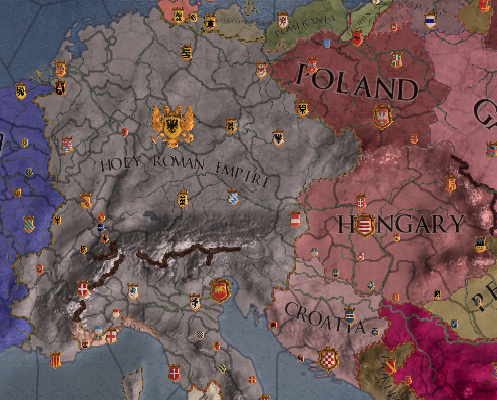

To the Northwest, England is being invaded by two forces at once: one led by William the Bastard, Duke of Normandy, and the other by Harald Hardrada, King of Norway, both men claiming that the throne of England is rightfully theirs. The Saxon King Harold Godwinson desperately attempts to defend his kingdom, knowing that the future of England hangs in the balance.

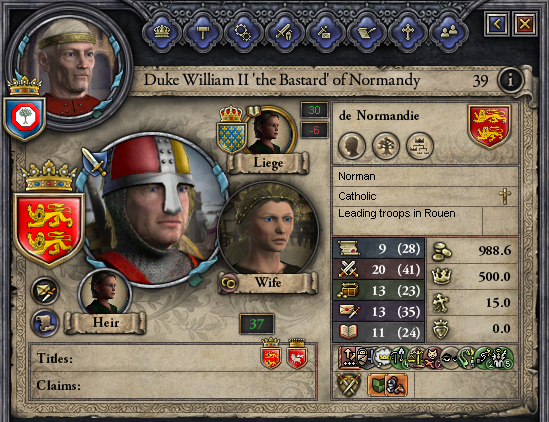
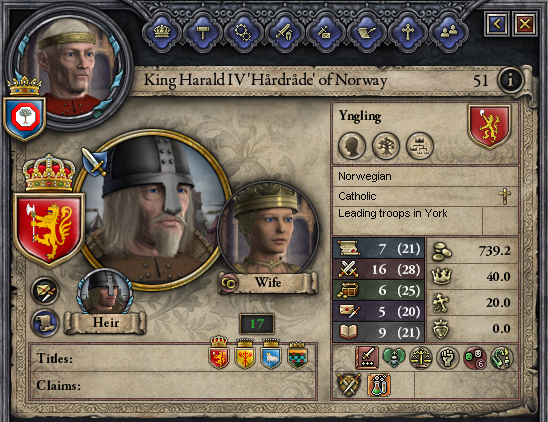
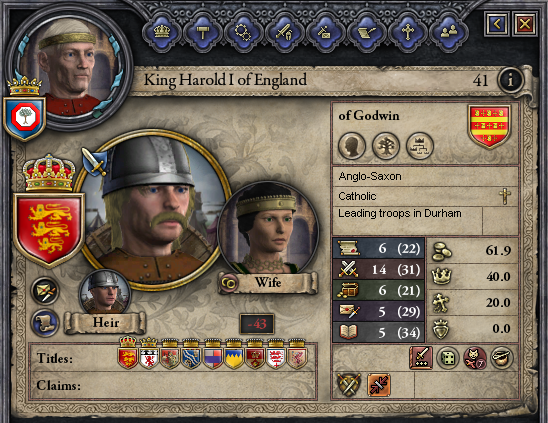
To the Northeast, the Rurikovich Princes of Russia squabble, bordered on one side by the Baltic and Finnish pagans, and on the other by the mighty Cuman Khanate.
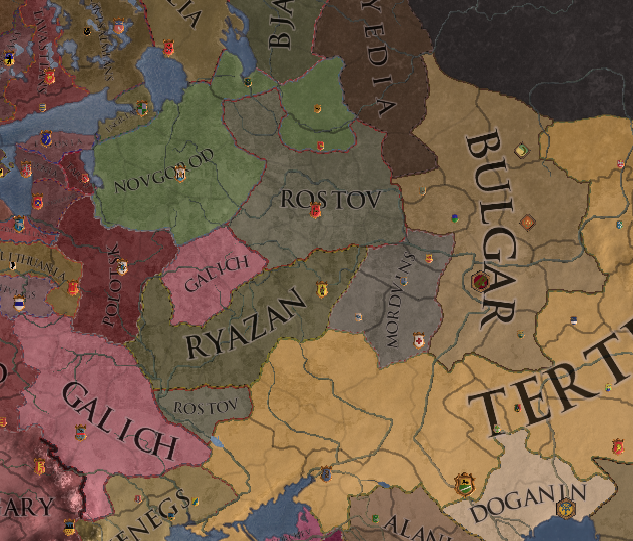
Few of these events matter to Duke Robert Guiscard, however. His concern remains extending his control over Sicily and the Mezzogiorno.
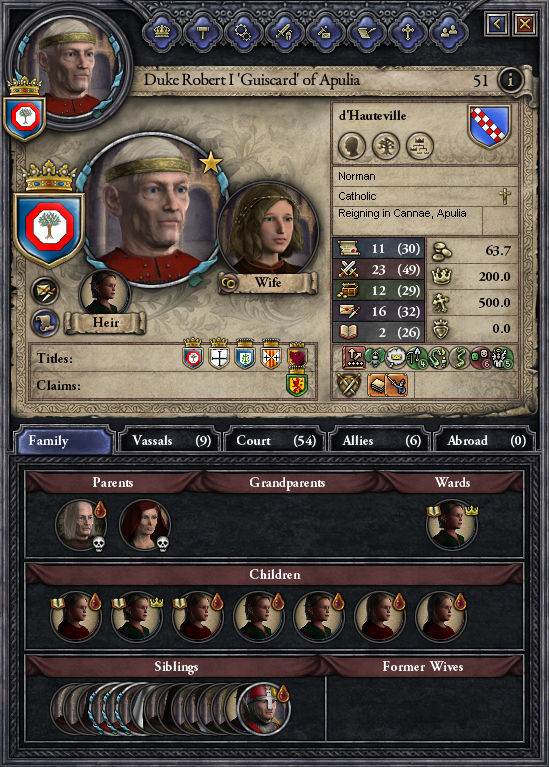
Of no small importance herself is Robert?s Lombard wife Sigelgaita, the daughter of the late Prince Guaimar IV of Salerno, a Norman ally, and sister of the current Prince of Salerno.

Sigelgaita is Robert?s second wife, however, his first marriage having been annulled in order to make the more politically useful match with Sigelgaita. Robert?s eldest son Bohemond was by his first wife Alberada. Still a child, Bohemond has already begun to display both the physical and mental gifts of his father.

Robert?s other two sons, Roger and Guy, are by Sigelgaita. Both are two young to assess just yet, but Roger has an unfortunate physical deformity that has left him slightly hunchbacked.


Most prominent among Robert?s vassals is his younger brother Roger, lord of Reggio and Messina. Nearly as brilliant as Robert himself, Roger is his brother?s right hand, despite the many conflicts, violent and otherwise, the two brothers have found themselves in over the years.
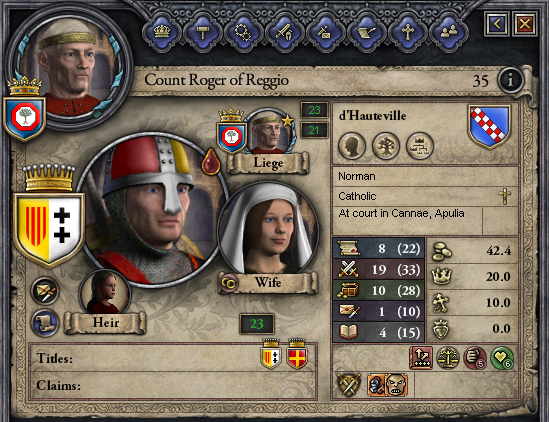
Also prominent among Robert?s vassals are his nephews Robert and Abelard. Robert, son of Robert?s older brother Geoffrey, rules Foggia, while Abelard, son of Humphrey, rules Taranto. Abelard is particularly notable for a certain level of resentment he feels toward Robert for what he considers the theft of his birthright.

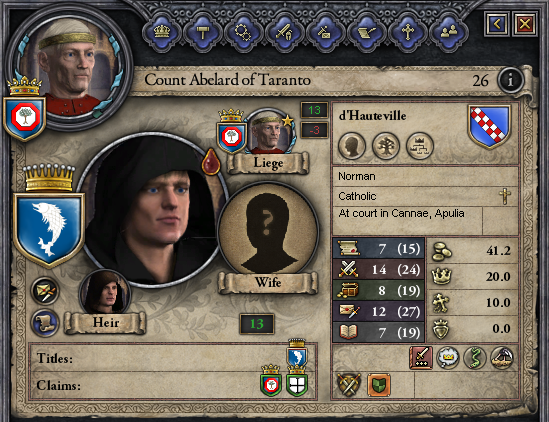
Robert?s final two major vassals are Geoffroy de Conversano and Geoffroy di Lecce, two vassals in Apulia.

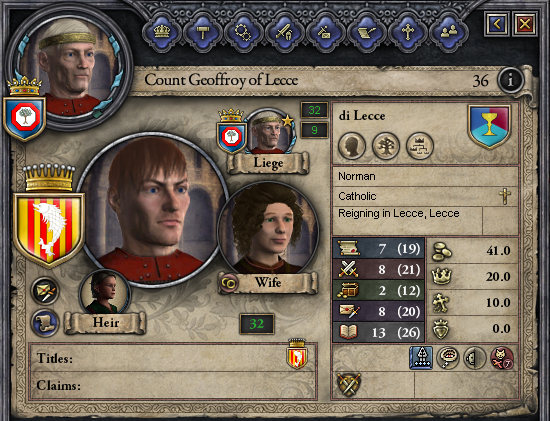
The few Normans in Southern Italy not loyal to Robert are under the rule of Richard Drengot, Count of Capua, friend and brother-in-law (through Robert?s sister) of Robert.
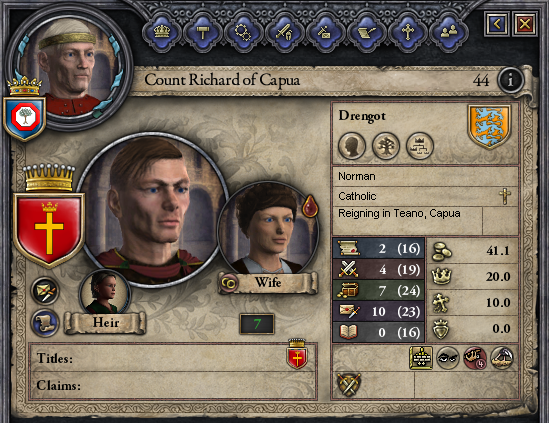
To his south is Naples, the last remnant of Greek power in Italy, ruled by Sergios Spartenos.

Further down the coast is Salerno, ruled by Sigelgaita?s brother Gisulf, a thoroughly reprehensible man despised by nearly everyone, including Robert. Only familial ties have so far prevented Robert from marching into Salerno and expelling his brother-in-law.
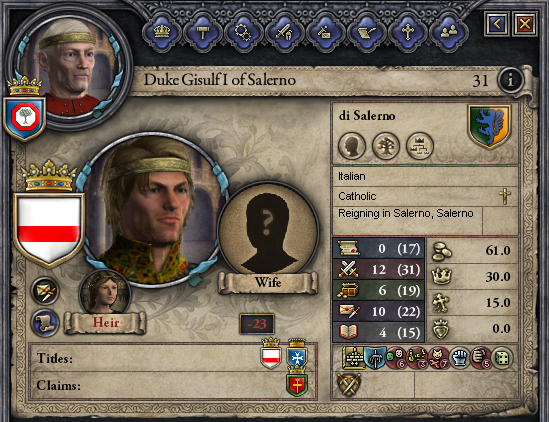
Finally, Landolf di Capua attempts to rule Benevento, nominally as a Papal vassal, but his rule is consistently undermined by the Normans, and few think his reign will be long.

Not to be forgotten is the current Pope, Alexander II, successor to Nicholas II. Currently he is friendly toward Robert and the Normans, especially due to his need for Norman support in case of conflict with the Holy Roman Empire. Already he has been forced to defend his papacy against the German-sponsored antipope Honorius II.
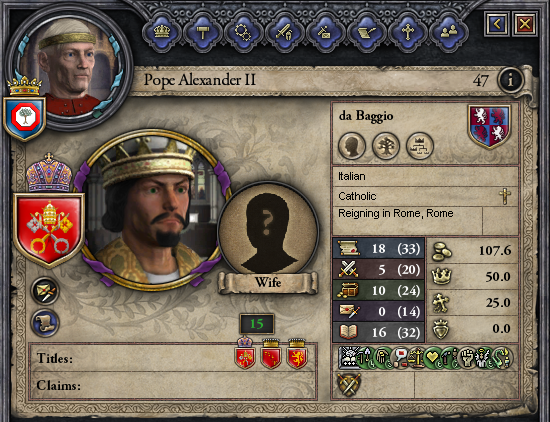
Robert?s current council is a rather informal collection of some of his most capable vassals, including his brother Roger and his nephew Abelard.
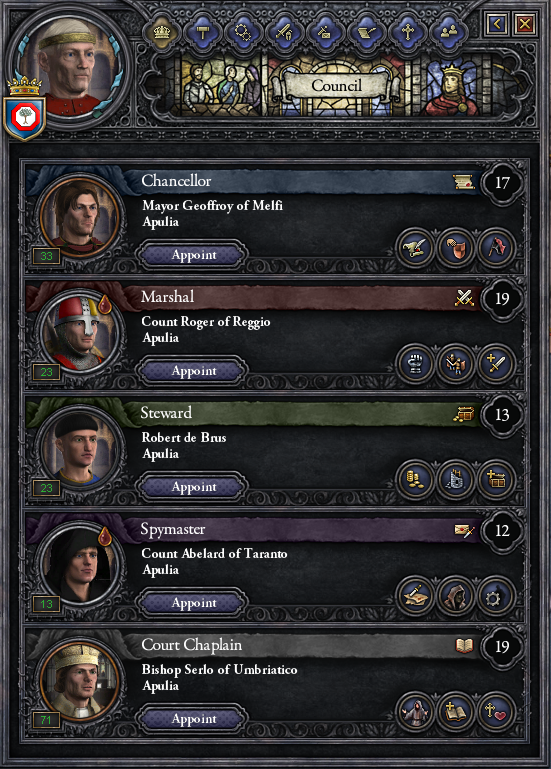
Robert is in excellent health at the moment, but should he die, his heir at the moment would be his son Bohemond. Norman succession in Southern Italy is loose, though (as demonstrated by Robert?s succession to the County of Apulia), and the principle of primogeniture is not strictly followed. Further complicating things is the fact that Bohemond could technically be considered a bastard, a position Robert?s wife Sigelgaita would no doubt like to take for the sake of her sons.
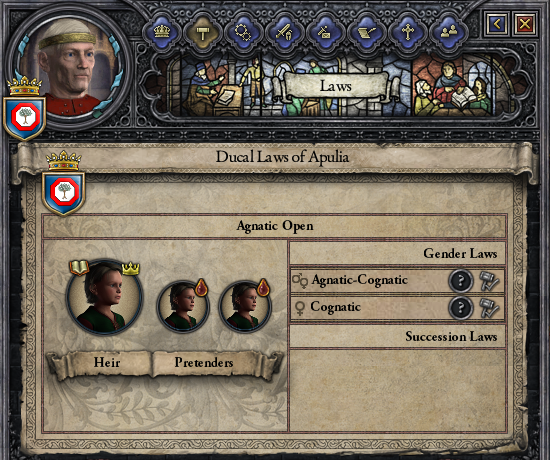
At the moment, Robert can call on fewer than 2000 men, but they are of very high quality, and they should be enough to continue his campaign in Sicily once Summer returns.
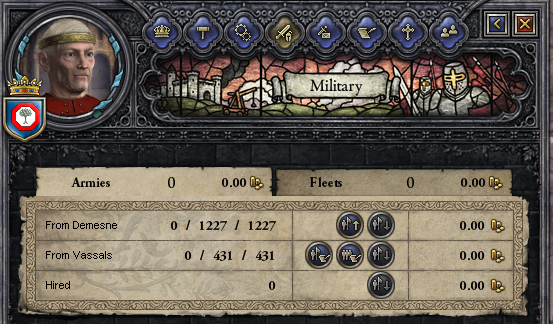
And that is exactly what Robert?s current goal is. Already he has begun preparations for a new campaign.

Before he can muster his armies, however, Robert is greeted with a nasty surprise ? an uprising by his nephew Abelard, with the stated goal of taking Robert?s titles for himself.

While Abelard himself is hardly a threat, the rebellion is made more serious by the betrayal of Count Roger, who no doubt sees it as an opportunity to get more land out of his elder brother.

Robert?s army meets Abelard?s outside the town of Mottola. The rebellious count is outnumbered two to one and outmatched by his uncle?s military skill.

Nevertheless, Abelard is able to inflict some casualties before being forced to retreat.

Robert has little time to rest, needing to march south to join up with his nephew Serlo and confront Roger.

There are serious casualties on both sides, but Robert emerges the victor again.

Robert quickly moves to lay siege to Abelard?s stronghold at Castellaneta, and it isn?t long before Abelard recognizes the futility of his situation.

With Abelard captured, the rebellion is over. Roger gives up arms and is quickly forgiven by Robert, as always.

Demonstrating once again his merciful streak, Robert releases and forgives Abelard as well.

Not at all discouraged by having to delay his plans, Robert once again readies his army for war, and in the summer of 1067, the invasion of Sicily is resumed.

Robert?s armies are depleted from the brief civil war, but Norman superiority at arms is demonstrated once again at Messina after the Saracens make an ill-advised foray into Norman territory.

The battle nearly takes a turn for the worse when Robert is wounded by an enemy arrow. Fortunately, though the wound takes him out of the battle, it is not life-threatening.

Thanks in large part to the leadership of Robert?s nephews Serlo and Count Robert in their uncle?s absence, the battle is won despite numerical inferiority.

After the battle, Robert is informed that his wife Sigelgaita, at home in Apulia, may be conspiring to kill Bohemond and secure the succession for her son Robert.

Outraged, Robert writes to her informing her of his knowledge of the plot, scaring her into confession and apology. Robert knows that his wife is too clever and wilful to be stopped for good, however.

But the sour taste of his wife?s betrayal is quickly wiped away. Against all odds, King Philippe of France has agreed to marry Robert?s eldest daughter Emma, securing for Robert not only a powerful ally, but also greater legitimacy through marriage with one of Europe?s greatest houses.

While Robert recovers from his injury his army marches to Palermo, where the city is besieged.

The city holds out for some time, but eventually it surrenders under favourable terms, and the Normans can finally claim to control most of Sicily.

Several minor Saracen lords remain, but without help from North Africa, they too will eventually fall to Norman armies.

Awful news arrives soon afterwards, when news reaches Robert that his son-in-law fell ill and died only days after his wedding.

Emma insists that the marriage was never consummated, however, and it is quickly arranged to have her marry the new king, Philippe?s younger brother Hugues.

Robert recovers fully from his injury, and it isn?t long before he is once again ready to lead his armies into battle.

To the east, the Byzantines have been pushed back by the Seljuk advance, and are forced to concede much of Anatolia to them in a humiliating peace treaty.

The old emperor having died, he is succeeded by his equally-incompetent son Michael, and the future of the so-called Roman Empire looks grim.

In England, the armies of William the Bastard and Harald Hardrada have both been defeated, ending the threat of foreign rule for the Anglo-Saxons.

Harold Godwinson stands triumphant, now undisputed King of England.

The Holy Roman Empire is less lucky, however, being consumed by revolt, particularly in Italy and Burgundy, where German armies have less reach.

The revolts are in large part due to the unpopularity of Heinrich IV, who is viewed as a tyrant by his vassals for his attempts to consolidate imperial power. Even more troublingly, he has been excommunicated by the Pope for his refusal to accept papal investiture of bishops, among other issues. The future unity of the Empire is at stake, and Heinrich seems helpless to preserve it.



























































